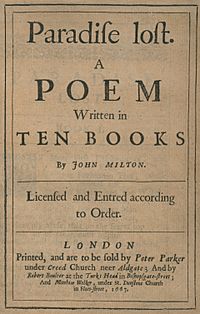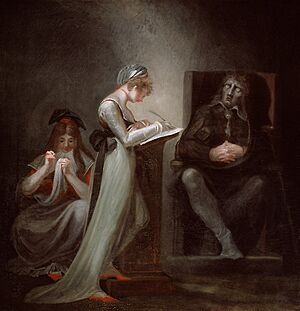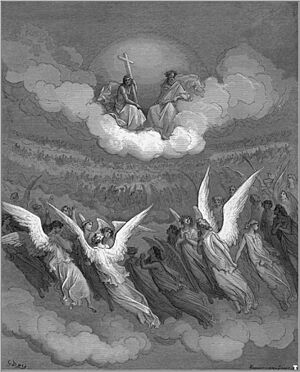Paradise Lost facts for kids

Title page of the first edition (1667)
|
|
| Author | John Milton |
|---|---|
| Country | England |
| Language | English |
| Genre | Epic poem |
| Publisher | Samuel Simmons (original) |
|
Publication date
|
1667 |
| Media type | |
| Followed by | Paradise Regained |
Paradise Lost is a very famous long poem, called an epic poem, written by an English writer named John Milton in the 1600s. It was first printed in 1667, but Milton wrote most of it about ten years before that. A second version came out in 1674. What's amazing is that Milton wrote most of this poem after he became blind.
The poem tells the Christian story of the Fall of Man. It explains how Adam and Eve were sent out of the beautiful Garden of Eden. It also tells the story of Lucifer, a powerful fallen angel who rebelled against God.
Contents
What is Paradise Lost?
Paradise Lost is an epic poem, which is a very long story poem. Epic poems often tell about brave heroes or important events in history or myths. Milton's poem is special because it tells a religious story in a grand, epic way. It has twelve books, like chapters in a novel.
Who Was John Milton?

John Milton (1608–1674) was a very important English poet and writer. He lived during a time of big changes in England, including the English Civil War. Milton was a strong supporter of Oliver Cromwell and the Commonwealth. He worked for the government as a secretary.
Milton started losing his eyesight in the 1640s and became completely blind by 1652. Even though he couldn't see, he continued to write. He would dictate his poems, including Paradise Lost, to his daughters or assistants. This shows how determined he was to share his stories and ideas.
The Main Story: Good vs. Evil
Paradise Lost explores big ideas like good versus evil, free will, and obedience. The poem focuses on two main storylines that eventually connect: the rebellion of Lucifer (who becomes Satan) in Heaven and the story of Adam and Eve in the Garden of Eden.
Satan's Rebellion
The poem begins not in the Garden of Eden, but in Hell. It describes Satan and his fellow angels after they have been defeated and cast out of Heaven. Satan, once a powerful angel named Lucifer, led a rebellion against God. He believed that it was "better to reign in Hell than serve in Heaven."
Satan is a very complex character in the poem. He is proud and determined, even in defeat. He decides that since he cannot defeat God directly, he will try to corrupt God's newest creation: humans. He plans to trick Adam and Eve into disobeying God.
Adam, Eve, and the Garden

The poem then shifts to the beautiful Garden of Eden, where Adam and Eve live. They are innocent and happy, living in harmony with nature and God. God gives them only one rule: they must not eat from the Tree of Knowledge.
Satan, disguised as a serpent, enters the Garden. He uses clever words and lies to convince Eve that eating the forbidden fruit will make her wise and powerful, like God. Eve is tempted and eats the fruit. She then convinces Adam to eat it too.
After they eat the fruit, Adam and Eve lose their innocence. They become aware of their nakedness and feel shame. God discovers their disobedience and, as a punishment, sends them out of the Garden of Eden. This event is known as the Fall of Man. The poem ends with Adam and Eve leaving Paradise, but with a glimmer of hope for the future.
Why is it Important?
Paradise Lost is considered one of the greatest works of English literature. It is praised for its beautiful language, its grand scale, and its deep exploration of human nature and religious themes. It has influenced many writers, artists, and thinkers throughout history.
The poem makes readers think about important questions: What is good and evil? Do we truly have free will? What does it mean to be human? Even though it tells a religious story, its themes are universal and still relevant today.
Images for kids
-
The Return of Milton's Wife, Henry Fuseli (1798–99)
See also
 In Spanish: El paraíso perdido para niños
In Spanish: El paraíso perdido para niños
 | William L. Dawson |
 | W. E. B. Du Bois |
 | Harry Belafonte |



